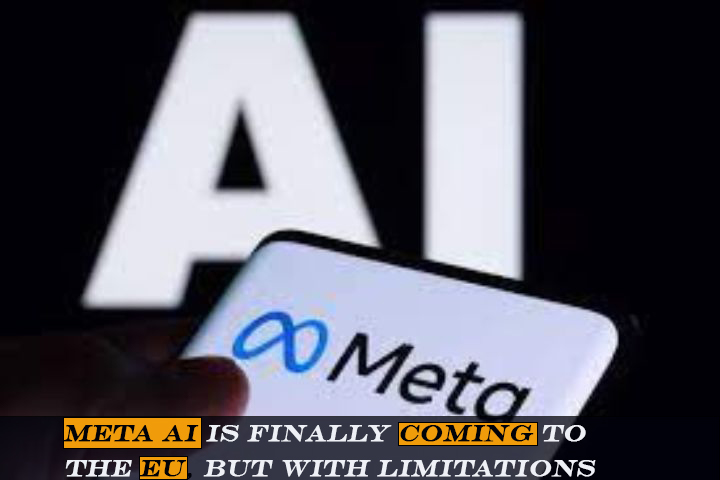
Meta AI is finally coming to the EU, but with limitations
Meta AI, the artificial intelligence division of Meta (formerly Facebook), has been making waves globally with its innovative advancements in AI technology. However, its expansion into the European Union (EU) has been met with both excitement and caution. After months of anticipation, Meta AI is finally making its way to the EU, but with certain limitations. This development marks a significant milestone in the tech industry, as it brings cutting-edge AI tools to one of the world’s most regulated markets. In this blog, we’ll explore what this means for users, businesses, and the broader AI landscape, while delving into the reasons behind the limitations and their potential implications.
Table of Contents
ToggleThe Arrival of Meta AI in the EU: A Long-Awaited Move

A Long-Awaited Move
Meta AI has been at the forefront of AI research and development, creating tools and technologies that power everything from content moderation to augmented reality. Its AI models, such as those used in natural language processing and computer vision, have been integrated into Meta’s suite of products, including Facebook, Instagram, and WhatsApp. However, the EU has historically been cautious about adopting new technologies, especially when it comes to data privacy and ethical concerns. This has delayed Meta AI’s full-scale rollout in the region.
The EU’s General Data Protection Regulation (GDPR) is one of the strictest data privacy laws in the world, and it has set a high bar for companies handling user data. Meta AI’s entry into the EU required careful navigation of these regulations to ensure compliance. After months of negotiations and adjustments, Meta has finally received the green light to introduce its AI technologies to EU users—albeit with some restrictions.
The Limitations: What’s Different in the EU?
While Meta AI’s arrival in the EU is a cause for celebration, it comes with notable limitations. These restrictions are primarily driven by the EU’s stringent data privacy laws and its commitment to ethical AI practices. Here are some of the key limitations:
- Data Localization Requirements: One of the most significant limitations is the requirement for data localization. Under GDPR, companies must store and process EU user data within the region. This means Meta AI cannot freely transfer data to servers outside the EU, which could impact the efficiency and scalability of its AI models. While Meta has established data centers in the EU, this restriction may slow down the deployment of certain AI features.
- Transparency and Explainability: The EU places a strong emphasis on transparency and explainability in AI systems. Meta AI will need to provide clear explanations of how its algorithms make decisions, particularly in areas like content moderation and personalized recommendations. This could limit the use of more complex, “black-box” AI models that are harder to interpret.
- Bias and Fairness: The EU is particularly concerned about algorithmic bias and fairness. Meta AI will be required to demonstrate that its models do not discriminate against individuals or groups based on factors like race, gender, or religion. This may involve additional testing and validation processes, which could delay the rollout of certain features.
- User Consent and Control: GDPR mandates that users must give explicit consent for their data to be used in AI systems. Meta AI will need to implement robust consent mechanisms, allowing users to opt in or out of data collection and processing. This could reduce the amount of data available for training AI models, potentially affecting their performance.
- Ethical AI Guidelines: The EU has been a leader in promoting ethical AI practices, and Meta AI will need to align with these guidelines. This includes ensuring that AI systems are used in ways that respect human rights and do not cause harm. For example, Meta AI may face restrictions on using its technology for surveillance or other controversial applications.
Implications for Users and Businesses

meta AI Implications for Users and Businesses
The introduction of Meta AI in the EU, despite its limitations, is a significant development for both users and businesses. Here’s how it could impact different stakeholders:
For Users:
- Enhanced User Experience: Meta AI’s technologies have the potential to improve user experiences across Meta’s platforms. For example, better natural language processing could lead to more accurate translations and more engaging chatbots. Similarly, advancements in computer vision could enhance augmented reality features on Instagram and Facebook.
- Greater Control Over Data: The emphasis on user consent and control means that EU users will have more say in how their data is used. This could lead to greater trust in Meta’s platforms, as users feel more empowered to manage their privacy.
- Ethical AI Practices: The EU’s focus on ethical AI ensures that Meta AI’s technologies are used responsibly. Users can feel more confident that the AI systems they interact with are designed to prioritize fairness and avoid harm.
For Businesses:
- New Opportunities for Innovation: Businesses that rely on Meta’s platforms for marketing and customer engagement could benefit from Meta AI’s advanced tools. For example, AI-driven analytics could help businesses better understand their audiences and optimize their campaigns.
- Compliance Challenges: The limitations imposed by GDPR and other EU regulations may pose challenges for businesses using Meta AI. Companies will need to ensure that their use of AI tools complies with local laws, which could involve additional costs and resources.
- Competitive Advantage: Businesses that successfully navigate the regulatory landscape and leverage Meta AI’s capabilities could gain a competitive edge. By adopting ethical and transparent AI practices, they can build trust with their customers and differentiate themselves in the market.
The Broader AI Landscape in the EU

The Broader AI Landscape in the EU
Meta AI’s entry into the EU is part of a larger trend of AI adoption in the region. The EU has been actively working to establish itself as a global leader in ethical AI, with initiatives like the AI Act, which aims to create a comprehensive regulatory framework for AI technologies. By setting high standards for transparency, fairness, and accountability, the EU is shaping the future of AI in a way that prioritizes human rights and societal well-being.
However, the EU’s cautious approach also raises questions about its ability to compete with other regions, such as the United States and China, where AI development is often less constrained by regulation. While the EU’s focus on ethical AI is commendable, it could potentially slow down innovation and limit the region’s ability to attract top AI talent and investment.
Looking Ahead: Balancing Innovation and Regulation
The arrival of Meta AI in the EU represents a delicate balance between innovation and regulation. On one hand, it brings state-of-the-art AI technologies to a market that has been eager to embrace them. On the other hand, the limitations imposed by EU regulations highlight the challenges of developing AI in a highly regulated environment.
As Meta AI continues to expand its presence in the EU, it will need to navigate these challenges carefully. This may involve investing in local infrastructure, collaborating with regulators, and adopting a more transparent and ethical approach to AI development. At the same time, the EU will need to ensure that its regulations strike the right balance between protecting users and fostering innovation.
Ultimately, the success of Meta AI in the EU will depend on its ability to adapt to the region’s unique regulatory landscape while delivering value to users and businesses. By doing so, it can set a positive example for other tech companies and contribute to the development of a more ethical and responsible AI ecosystem.
Conclusion
Meta AI’s entry into the EU is a landmark moment that underscores the growing importance of AI in our daily lives. While the limitations imposed by EU regulations may pose challenges, they also reflect a commitment to ethical AI practices that prioritize user privacy and fairness. For users, this means access to advanced AI tools with greater transparency and control. For businesses, it presents both opportunities and challenges as they navigate the evolving regulatory landscape.
As Meta AI continues to expand its reach, it will be fascinating to see how it adapts to the EU’s unique environment and contributes to the region’s AI ecosystem. One thing is clear: the intersection of AI and regulation will play a critical role in shaping the future of technology, not just in the EU, but around the world.




